SUTD Pioneer Joshua Cheong’s Learning Journey

HASS caught up with SUTD pioneer Joshua Cheong to find out what he has been up to since graduation, including his stint in the banking industry, and how he is enjoying graduate school in the UK so far!
What scholarship have you been awarded and how did you feel when you learnt the news?
I was awarded two partial scholarships which together, help fund my masters. The first was the Commonwealth Scholarship in Innovation and the second was the Financial Scholarship Programme (FSP) from the Monetary Authority of Singapore (MAS). I was ecstatic when it happened, as it was certainly the best outcome out of the scenarios I planned. I also feel extremely honored and grateful for winning the awards, especially since the Commonwealth Scholarship in Innovation was an inaugural award.
There is a sense of responsibility to give back and to act on the promises I gave in the interviews to win the scholarships. I believe if you receive public money, the knowledge and skills you gain from your degree are no longer exclusively yours and it needs to be given back in economic value to the society.

Joshua’s arrival to SUTD’s dormitory room in Dover back in 2012 to kick-start his undergraduate journey

Leading his Orientation team
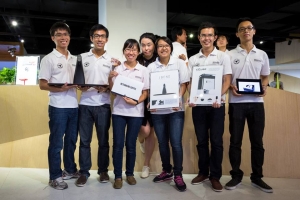
Joshua and his teammates presenting the Coffee Machine Project in Zhejiang University, 2013 Asian Leadership Programme
What are you studying now in Cambridge University and how does it enrich your previous training in engineering at SUTD?
I am pursuing a Masters of Philosophy (M.Phil.) in Technology Policy at Cambridge Judge Business School. The degree focuses on economic frameworks to understand the effects of technology change on industries and identify situations for government intervention. A recent example of what I studied was Rohlfs’ demand curve when a company or product has network effects (such as Uber/Facebook/Whatsapp). Unlike the typical downward sloping demand curve, if the value of a good to the customer depends on the quantity sold to the market due to network effects, the demand slope is fundamentally different. This has interesting implications for market failures where it is possible for an inferior technology to overshadow a superior technology simply because of a more aggressive push for users to adopt an inferior technology. In these situations, perhaps there is an opportunity for government policy to encourage technology transfer.
When I did engineering in SUTD (ISTD), you often assume that if you build things faster, cheaper, and better you will be able to make an innovative impact. My current degree explains why other considerations such as navigating government regulations, network effects, business models may take precedence in explaining the success of many of these “unicorn” companies. I believe a combination of the technical knowledge from SUTD and a contextual understanding of the economic principles behind technology will allow me to make better leadership decisions in the long run.
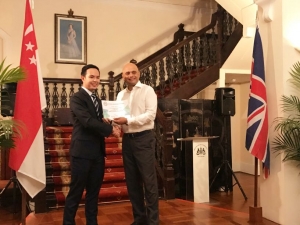
Receiving the Commonwealth Scholarship in Innovation Award
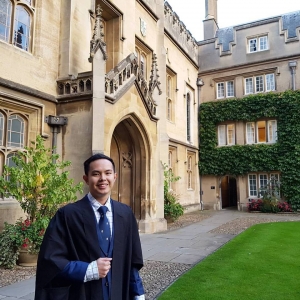
Matriculation at Sidney Sussex College, Cambridge University

Currently studying at Cambridge Judge Business School
How did your experience in SUTD prepare you for your graduate programme?
My SUTD experience was invaluable in preparing me for the graduate programme and my career.
Firstly, due to the collaborative and multi-disciplinary approach we have in SUTD with so many group projects, it makes you a well-rounded and resourceful team player and sometimes you often are surprised at how much your peers from other universities find it difficult to work with each other. That is because some universities emphasize putting the right answers on paper, but great projects rely on team effort and leadership. Getting the job done well is a rare quality.
Secondly, being in a relatively new school like SUTD made me comfortable with learning new things such as machine learning and blockchain development even after leaving university. In your career, you will face situations where an emerging field of work or research will come up almost suddenly for you to take it as an opportunity. Having the flexibility and confidence to learn and adapt given your experience in SUTD will empower you to take the first steps when others do not.
Lastly, HASS in SUTD made me aware of my ignorance of how the world operates. Lessons in history, sociology, and even readings of the classics help me understand that many of the “new” phenomena are not necessarily new but merely forgotten through time. The awareness of my ignorance drives my curiosity to read more and question more, instead of living in self-righteous misunderstanding.
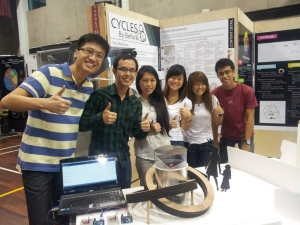
First major project group in SUTD (Introduction to Design)
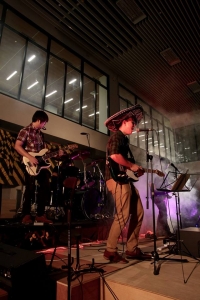
SUTD Band Performance (Guy wearing the Sombrero)
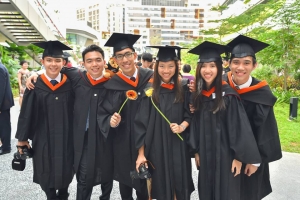
Graduation Day at SUTD
What are your plans after completing your graduate programme?
My plan is to work in the innovation field for financial services in Singapore. My previous experience as a Management Associate in Citibank has allowed me to identify Fintech/E-commerce as an emerging field for growth and leadership in South-East Asia. I hope to either facilitate investments in many of these innovative Fintech/E-commerce businesses or join them to help them scale.
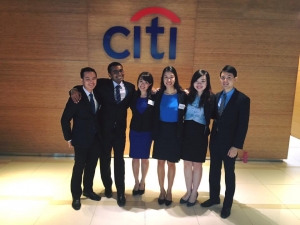
Management Associate training stint at Citi Bank
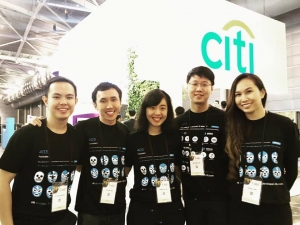
Representing Citi in the Singapore Fintech Festival 2016
What advice do you have for your SUTD juniors about making the most of their SUTD experience?
While I understand that grades are important in SUTD and you must work very hard, I hope you broaden your experience and develop a career strategy.
To broaden your experience, take on team projects that will expose you to industry work and give yourself chances to make mistakes. If projects do not work out, own the problem and figure out why. Through pain, you will learn so much more about yourself or your team when you fail. The key is to then avoid the same mistakes. My first project at Citibank tanked badly and at first, I thought it was just me who was having problems but I realized it was a team-related issue with work delegation and communication. The pain made me work on developing better delegation skills so that I can be ready to coordinate a team in the future. Subsequent projects were much more successful.
To develop a career strategy, I recommend to read current affairs and consulting papers, and then try to anticipate how the world will change in your context. Try to identify where career opportunities may lie. Be aware of how your views can be biased and adjust them accordingly. Only 12% of Fortune 500 companies from 1955 exist in 2016. Chances are, the industries you thought you would be “hot” when you entered university will be different from the prime ones when you graduate. Then find a few notable people whom you admire in the field that you are interested in and read their biographies. It helps if those people have a similar personality to you. Learn what socio-economic backgrounds they came from, how they grew up, and how they overcame problems. Figure out what you can emulate and what you cannot. As you have time in university to think about it, please make sure you develop a plan even if you are likely to change it as you go along.
